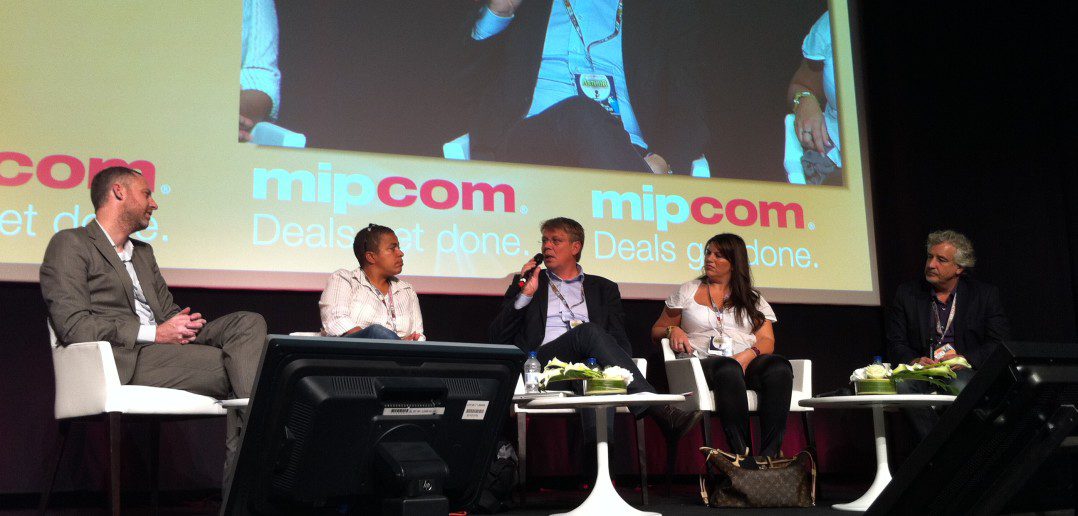The first session at MIPCOM today was held by Entertainment Master Class, focusing on lowering the costs of back-to-back and multi-territory co-productions.
Moderated by attorney Christoph Fey, the panel debate featured (l-r in photo): Sara Goldensohn, head of development at Kanal 5 AB in Sweden; Elvind Landsverk, program director at TVNorge & FEM in Norway; Maria Thastum, head of entertainment at SBS TV in Denmark; and Ludo Poppe, president of 4mat4media in Flanders.
Landsverk began with a presentation, and made the point that multi-territory co-productions aren’t a new thing, with shows like Robinsson, Fort Boyard, I’m A Celebrity – Get Me Out of Here and Paradise Hotel, where different broadcasters travel to a single location to shoot localised versions of a show.
He also talked about Scandinavia specifically, where Norway, Sweden and Denmark are all small markets with limited budgets for local productions.
Hence ‘Pan Scandi productions’ where broadcasters in each country team up, reducing costs and increasing their return on investment, while also bumping up the number of hours locally produced.
He admitted that there are challenges though, including differences in language and culture, and the fact that there are “very few, or even no common celebrities between Norway, Sweden and Denmark”. A big challenge for celebrity-led formats.
The Scandinavian ProSiebenSat.1 group, which has broadcasters in each of the three countries, has co-produced shows like Temptation Island, Big Brother, So You Think You Can Dance and intriguingly-titled shows like Gay Army and The Bachelor Santas.
At this point, Thastum took over to talk about Pan Scandi productions in more detail, which started in 2001 with Temptation Island and a ‘one master’ approach, where only one version of the show was made, and screened in all three markets.
“It was a huge experiment in having people from different countries work together,” she said. “It was quite a challenge, and important that we did it in a democratic way, with an equal number of people from each country.”
With hindsight, she said that’s ridiculous – “if you try to do that, where everyone is equal, you lose all the synergy effects”.
However, Thastum said that the broadcasters then shifted to a ‘Local Masters’ approach, where there is one recording, but then three locally edited versions with different hosts.
Shows like The Biggest Loser and So You Think You Can Dance used the same pool of contestants drawn from each country, but the local versions gave their local participants 70% of the airtime.
The ProSiebenSat.1 group has also run back-to-back productions, where each broadcaster shoots a different version of a show, but in the same studio or location. Dating In The Dark was one show to benefit from this.
“In 2008, we realised that the Pan Scandinavian productions were not doing well,” said Thastum, citing So You Think You Can Dance as a “huge flop”.
Why? One of the big problems was that viewers simply weren’t interested in participants from other countries, and overwhelmingly voted for their own.
“We found that we didn’t give a sh*t about each other, quite frankly!” said Thastum, getting a big laugh from the audience.
Cue a rethink. So the new approach is ‘Competition + Local Masters’, where there is one recording with three locally edited versions, with different hosts and participants competing: teams from each country.
Effectively, it’s like a sports production – the Olympics for example – where local broadcasters tend to focus most on their own country’s athletes.
The approach was used for a late-night show called Silent Library, which performed very well, and then for Endemol format Wipeout, which was also successful – the highest rated TV show ever in Sweden and Denmark, and a huge success in Norway too.
In other words, the fact that Scandinavians don’t care about one another was turned into a big positive, playing on the competitive aspects.
At this point, Poppe from 4mat4media joined the conversation, giving a producer’s perspective from the Benelux region on a show called Peking Express, where couples race to hitchhike from Moscow to Beijing, completing challenges on the way.
It was a Flanders-Holland co-production. “The fact that we could make such a good show out of a small territory is quite unique,” said Poppe.
He also talked about the different ways of line-producing these kinds of shows: simultaneous production, back to back productions, and subcontracting specialised knowledge and expertise – the approach used for Peking Express.
This involved finding local firms in each country for issues like customs, transport, logistics and security expertise, ensuring that 4mat4media could sell this into broadcasters.
Poppe says this saves money for broadcasters, while allowing local producers to mitigate their production risk and focus on the creative. He admitted that it also means they make less money from it.
He thinks there will be much more line-production, due to pressure on budgets, the fact that more IP is travelling, and the needs of international production companies, and internal production companies at broadcasters.
In the Q&A session, the panel were asked whether these kinds of international co-productions will just be for small markets, or whether they could work for larger countries like the UK, France and Germany.
Thastum admitted that right now, the big players in those markets don’t need to work in this way, but said further down the food chain it may be a different story.
“Wouldn’t it be maybe a good idea for the smaller broadcasters in those countries to work like this?” she said. “It would be a way for the smaller broadcasters to get into the big international formats.”




